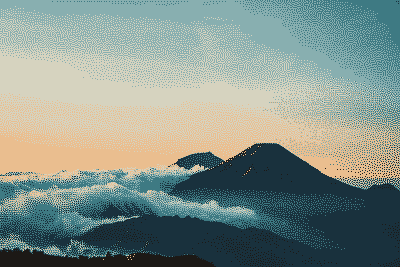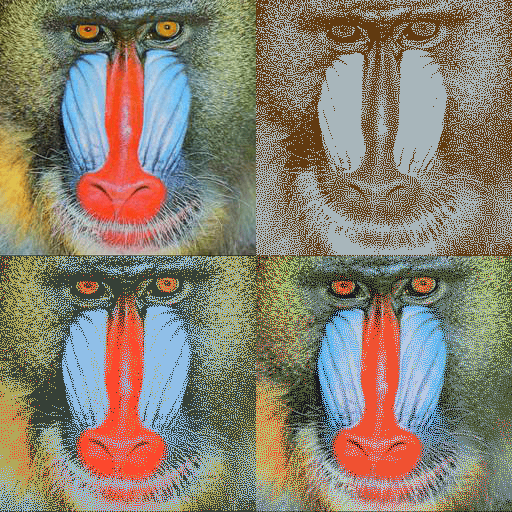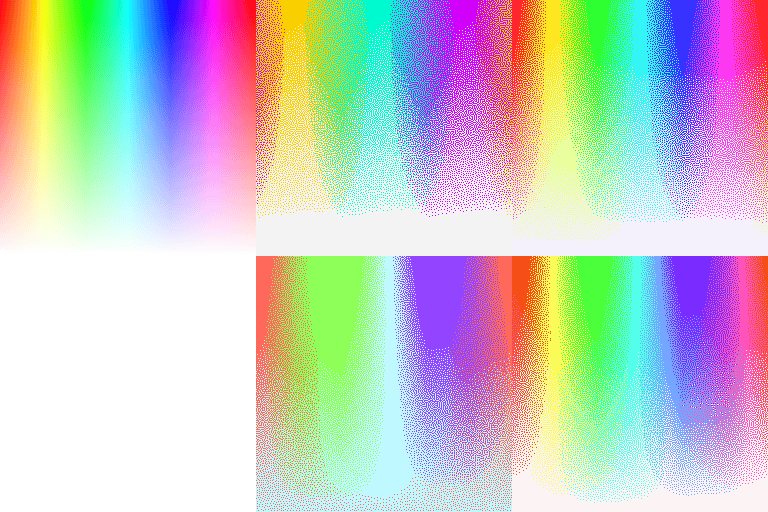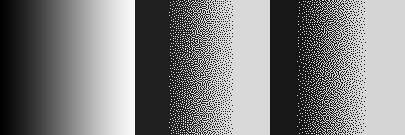4 releases
| 0.2.0 | Mar 30, 2021 |
|---|---|
| 0.1.2 | Feb 20, 2021 |
| 0.1.1 | Nov 16, 2020 |
| 0.1.0 | Oct 23, 2020 |
#724 in Images
99KB
2K
SLoC
rscolorq

Rust port of Derrick Coetzee's scolorq, based on the 1998 paper
"On spatial quantization of color images" by Jan Puzicha, Markus Held, Jens
Ketterer, Joachim M. Buhmann, & Dieter Fellner. Spatial quantization is
defined as simultaneously performing halftoning (dithering) and color
quantization (limiting the colors in an image). For more information, visit
the original implementation's website.
The algorithm is excellent for retaining image detail and minimizing visual distortions for color palettes in the neighborhood of 4, 8, or 16 colors, especially as the image size is reduced. It combines limiting the color palette and dithering the image into a simultaneous process as opposed to sequentially limiting the colors then dithering. Colors are chosen based on their context in the image, hence the "spatial" aspect of spatial color quantization. As in Pointillism, the colors are selected based on their neighbors to mix as an average illusory color in the human eye.
To use as a library, add the following to your Cargo.toml; add the
palette_color feature to enable Lab color quantization. Executable builds can
be found at https://github.com/okaneco/rscolorq/releases.
[dependencies.rscolorq]
version = "0.2"
default-features = false
Examples
Images are best viewed at 100% magnification.
1) Mandrill

Top row: Original image, RGB 2 colors
Bottom row: RGB 4 colors, RGB 8 colors
rscolorq -i mandrill.jpg -o mandrill-rgb2.png -n 2 --auto -s 0 --iters 5
rscolorq -i mandrill.jpg -o mandrill-rgb4.png -n 4 --auto -s 0 --repeats 3
rscolorq -i mandrill.jpg -o mandrill-rgb8.png -n 8 --auto -s 0 --iters 5
The --iters and --repeats options can be used to increase their values over
the default to improve the quality of output. --auto sets the dithering
level based on the image size and desired palette size. The --seed or -s
option sets the random number generator seed; otherwise, it's seeded randomly.
2) Palette swatches and fixed palette
Palette swatches can be generated by passing --op plus a filename. --width
and --height can be passed to specify the width and height of the resulting
palette image. The following swatches are the colors that comprise 4 and 8 color
dithered images in the bottom row of the previous image.
![]()
![]()
rscolorq -i mandrill-resize.jpg --op mandrill-rgb4-pal.png -n 4 --auto -s 0 --repeats 3
rscolorq -i mandrill-resize.jpg --op mandrill-rgb8-pal.png -n 8 --auto -s 0 --iters 5 -p
Passing the --print or -p flag will print the hexadecimal colors to the
terminal as seen in the second example above. If no --output or -o is
passed, the dithered image will not be saved to a file.
b5c970,191821,b7cbe7,6d7f7b,5db7f0,4e5936,f05131,939bcc
Custom color palette
You can supply your own palette to dither with by passing --colors or
-c followed by a list of hexadecimal colors as in the following example.

Original image on the left, fixed palette on the right.
rscolorq -i scenic.jpg -o mountain-pal.png -c FFBF82,09717E --auto -s 0 --iters 5`
3) Gradients

Top row: Original image, RGB 4 colors, RGB 8 colors.
Bottom row: Lab 4 colors, Lab 8 colors.
rscolorq -i rainbow.png -o rainbow-rgb4.png -n 4
rscolorq -i rainbow.png -o rainbow-rgb8.png -n 8 --iters 8 --repeats 2
rscolorq -i rainbow.png -o rainbow-lab4.png -n 4 --lab
rscolorq -i rainbow.png -o rainbow-lab8.png -n 8 --lab --iters 8 --repeats 2

Left to right: Original image, 2 colors filter size 3, 2 colors filter size 5.
Features
- use RGB or Lab color space for calculations
- option to dither based on fixed color palette supplied by the user
- seedable RNG for reproducible results
- print the palette colors to the command line in hexadecimal
- create a palette swatch image from the dither colors
Limitations
It's "slow"
- Larger images or images with smooth transitions/gradients will take longer. Higher palette sizes will take longer.
- The algorithm is suited towards retaining detail with smaller color palettes. You can still use it on larger images but be aware it's not close to real-time unless the image is small.
Filter size 1x1
- Doesn't produce an image resembling the input, nor does the original.
Filter size 5x5
- Doesn't always converge.
- I'm unsure if this is an error in this implementation or a problem with the random number generator being used. The original implementation may take a while but eventually completes with filter size 5.
- Any help on this would be appreciated.
Troubleshooting
If you get an invalid color error or hex color length error with the command line tool, try enclosing the color string in quotes.
For example, instead of -c 000000,ffffff use -c '000000,ffffff'.
License
This crate is licensed under either
- the MIT License, or
- the Apache License (Version 2.0)
at your option.
Unless you explicitly state otherwise, any contribution intentionally submitted for inclusion in the work by you, as defined in the Apache-2.0 license, shall be dual licensed as above, without any additional terms or conditions.
Copyright of the original images is property of their respective owners.
Dependencies
~1.3–3.5MB
~60K SLoC